Career Blogs

Navigating the Return to Office Trend
Whether you are looking for a new career opportunity or your current employer is asking for a return to the office, the return-to-office trend can be worrying. It is a trend that is now firmly established as companies increasingly ask their employees to spend more time in the office. That could be a hybrid arrangement or, in some cases, moving to fully on-site.
It is a challenging situation on multiple fronts. For companies, remote and hybrid working brought benefits, but it also brought challenges. For example, young people entering the workforce don’t get the same opportunities to build relationships and experience a team environment when working from home.
For many employees, working from home offered benefits ranging from increased flexibility to less commuting time that would be at risk with a return to the office.
Tips and Advice
SL Controls Talent Acquisition Consultant, Jess Delahunt, offers tips and best practices for employees navigating the return to office trend. Jess said: “Don’t let the return to office trend put you off applying for a role where the working pattern doesn’t meet your requirement, but you feel you can deliver.
“It’s important to remember there is no requirement to state your availability to be at an office on your CV. It’s also important to remember that in many industries, there is still a talent shortage.
“The best advice is to secure your interview so you can show what you can deliver before raising an issue with the employer’s preferred in-office requirement. You can do this by preparing a quantifiable and qualitative list of what you have delivered while working remotely. It helps to emphasise productivity gains.
“Don’t, however, be forceful or demanding. Instead, be open to compromise and present the employer with potential solutions, not just problems. For example, working four days onsite for the first three months and then two thereafter. Or, fully onsite for six months to show you can deliver and remote thereafter except when required.
“Don’t be demanding on salary either, as too many question marks for the employer causes risk aversion. If it is the right opportunity for you, the small loss in salary will easily be compensated by flexibility around remote and hybrid working.
“Remember you don’t have to accept an offer you are unhappy with or that doesn’t work for you. In all negotiation situations, you have to be prepared to walk away to secure the terms you want.
“If you are being interviewed, you have a value to that employer. While some employers have very strict policies, many don’t. With those that are more flexible, you need to show you are flexible too, as well as being solution-focused, willing to compromise, and able to add even more value while delivering better results with a flexible working situation.
“In summary, don’t be scared off by rigid job ads that demand large volumes of onsite working if this doesn’t work for you. If you can show the right value, flexibility, and competencies, then it could be the right role with the terms you want.”

Infographic: Reasons to Choose SL Controls as a Graduate
Over a third of our employees at SL Controls joined our team as a graduate. Find out more in our infographic about why graduates choose SL Controls, why they stay with us, and why you should look at the opportunities that we have available.
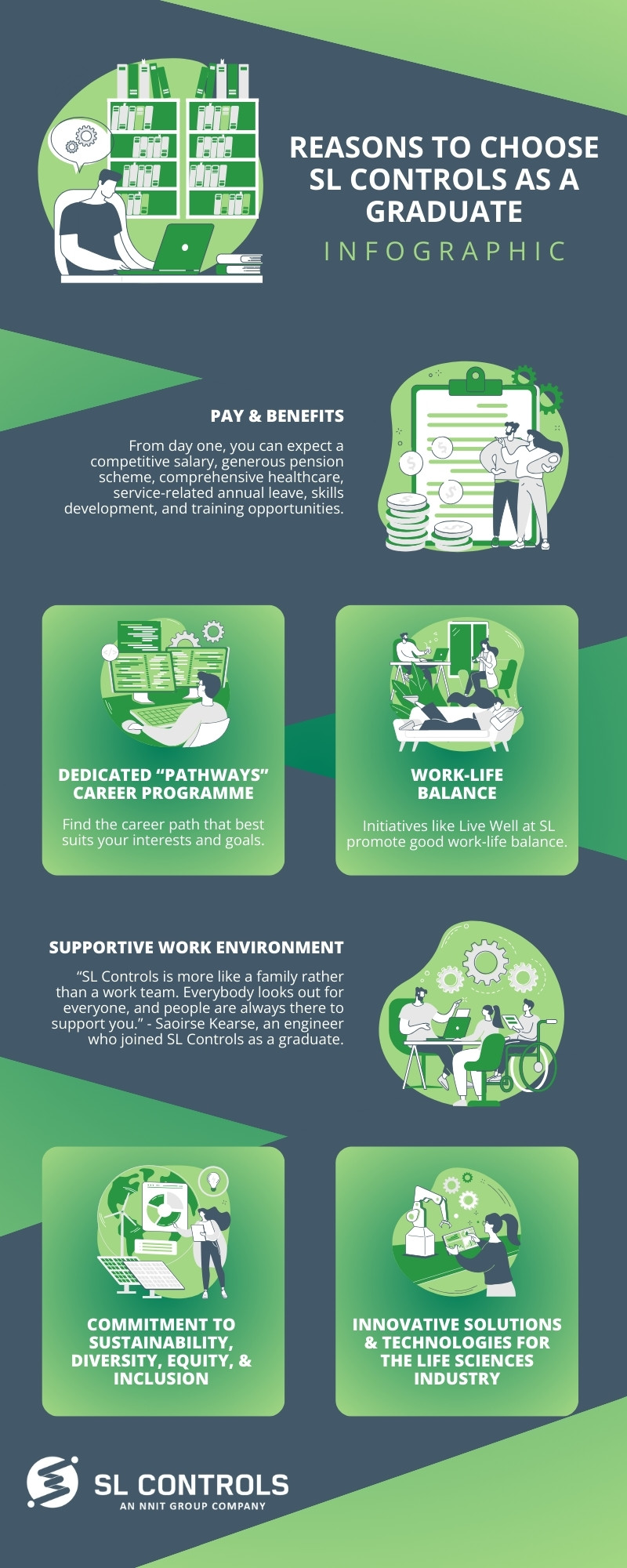
Reasons to Choose SL Controls as a Graduate
- Pay and benefits. From day one, you can expect a competitive salary, generous pension scheme, comprehensive healthcare, service-related annual leave, skills development, and training opportunities.
- Dedicated “Pathways” career programme. Find the career that best suits your interests and goals.
- Work-life balance. Initiatives like Live Well at SL promote good work-life balance.
- Supportive work environment. “SL Controls is more like a family rather than a work team. Everybody looks out for everyone, and people are always there to support you.” Saoirse Kearse, an engineer who joined SL Controls as a graduate.
- Commitment to sustainability, diversity, equity, and inclusion.
- Innovative solutions and technologies for the life sciences industry
SL Controls is now NNIT. Visit NNIT today.
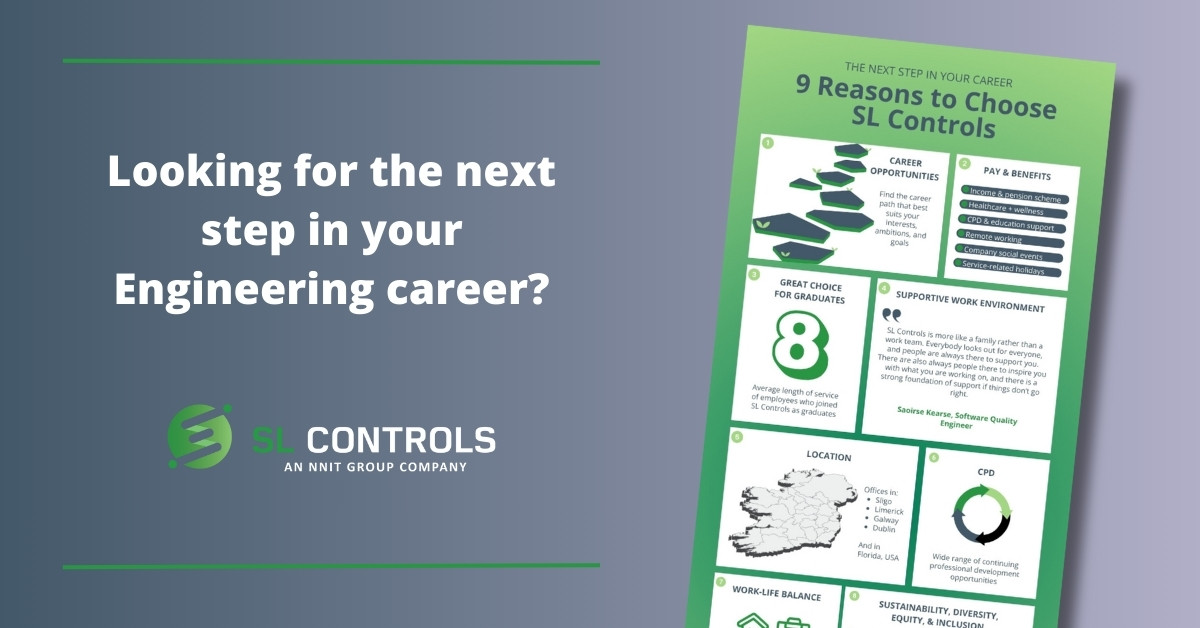
Reasons to Choose SL Controls for the Next Step in Your Engineering Career
At SL Controls, we operate at the cutting edge of our industry, providing best-in-class solutions for manufacturers in the life sciences and technology sectors. Our solutions automate and digitalise manufacturing processes as well as integrating equipment and systems across all production operations and business processes.
It’s an exciting field to work with great opportunities and a welcoming, supportive, and friendly team. Our new infographic explains more about why you should choose SL Controls as the next step in your engineering career.
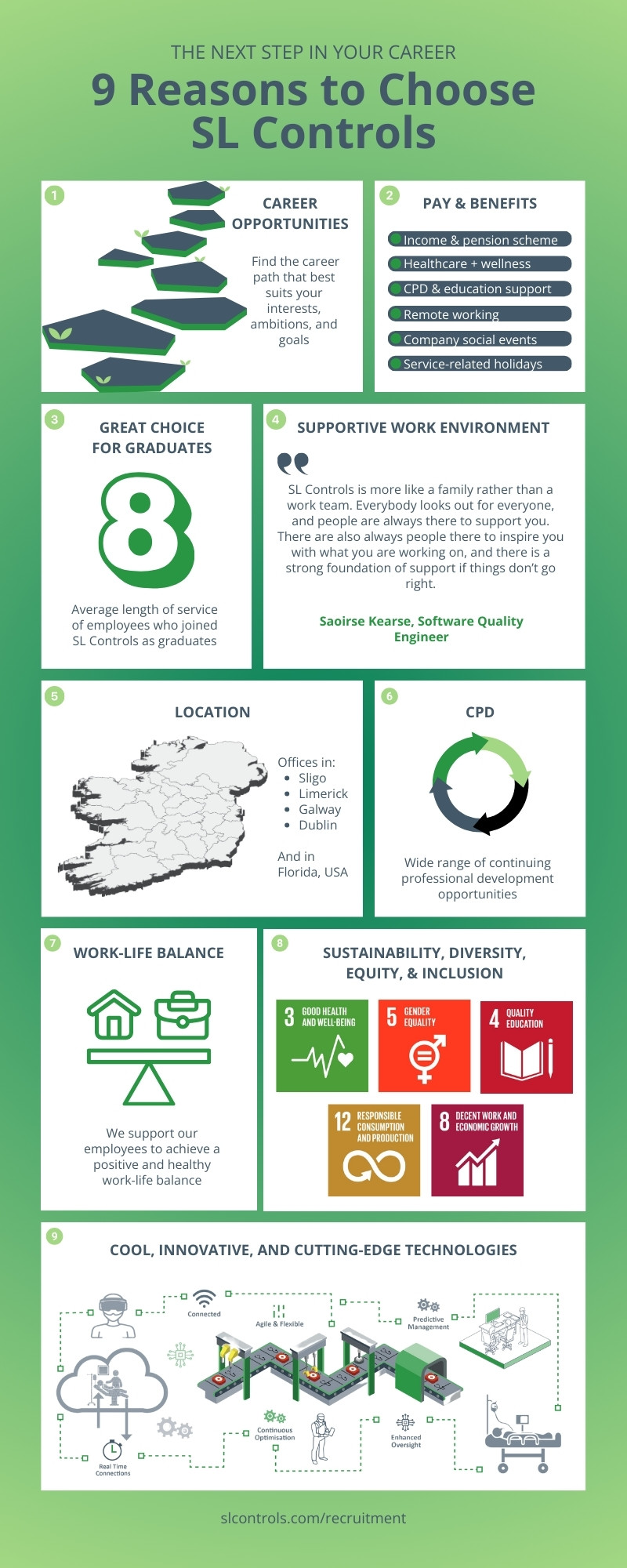

7 Reasons to Choose SL Controls as a Graduate
Choosing a graduate position is a big decision in the life of any newly qualified engineer. This blog aims to give you a flavour of what you can expect from SL Controls and why you should consider applying for one of our graduate roles.
If you want to find out more about what we do, check out the home and about pages on our website.
Let’s get on with the seven reasons to choose SL Controls as a graduate.
Pay and Benefits Package
The package of benefits you can expect as a graduate at SL Controls includes a competitive salary, generous pension scheme, and comprehensive healthcare. You will also get service-related annual leave, where the number of days holiday you get increases the longer you are employed, as well as skills development and other training and learning opportunities.
Career Opportunities
It is easy to talk about the career opportunities that exist in a particular company but sometimes it’s just better to look at the numbers. Research shows that a large percentage of employers in Ireland struggle to retain young talent. One of the reasons cited for these difficulties is a lack of career paths.
SL Controls performs quite well in this regard:
- We have a high proportion of graduates on our team.
- Retention rates for graduates are good.
- Graduates stay with us to progress their careers.
Let’s look at some numbers:
- 37% – the percentage of current employees who joined SL Controls as a graduate.
- 8 years – the average length of service of employees who joined SL Controls as graduates. The average length of service for non-graduates is 4 years.
We can see from the above statistics that graduates choose to develop their careers in SL Controls, but what are the career paths you can take? One thing you won’t find here is a career ladder, as we don’t believe there is a one-size-fits-all approach to career progression. Instead, we’ll help you find the career path that best suits your interests, ambitions, and goals, and we’ll provide you with support every step of the way.
Continuing Professional Development
Following on from the previous point, we offer employees a wide range of continuing professional development opportunities. This will help you enhance your skills and develop new capabilities.
Work-Life Balance
Supporting our employees to achieve a positive and healthy work-life balance is important to us at SL Controls. This includes using a hybrid model of operation, where most of our employees (except those working at client sites) work from home for the majority of the working week.
Supportive Work Environment
Don’t take our word for it – here is what members of the team say about the working environment at SL Controls:
Josh Morris, Systems Engineer (started at SL Controls as a graduate):
“Everyone is so friendly and helpful, and I can reach out to anyone with any questions I have. I could text someone that I have never spoken to before and I could ask them a question and they are always happy to respond.”
Blessing Nwachukwu, Systems Engineer (started at SL Controls as a graduate):
“It is a community, and the people are highly intelligent and brilliant. I don’t feel like I am siloed because teamwork is highly encouraged and there is always an open door so I can approach my colleagues. Whenever I have a question, my colleagues are always there to listen and support me with what I might require.”
Saoirse Kearse, Software Quality Engineer (started at SL Controls as a graduate):
“SL Controls is more like a family rather than a work team. Everybody looks out for everyone, and people are always there to support you. There are also always people there to inspire you with what you are working on, and there is a strong foundation of support if things don’t go right.”
Mark Hogan, Systems Engineer (started at SL Controls as a graduate):
“At SL Controls, there are great opportunities to learn new technologies, which is fantastic. There is also a great level of camaraderie in the team, and there are always people available to bounce ideas off and get a different perspective.”
Sustainability, Diversity, Equity, and Inclusion
At SL Controls, we strive to make a positive impact on society, and we have a commitment to diversity, equity, and inclusion. Read more on the links below:
Cool, Innovative, and Cutting-Edge Technologies
As a graduate engineer in SL Controls, you will get to work with the latest and most innovative technologies. This includes the latest Industry 4.0 and smart manufacturing technologies, as well as machine learning algorithms, digital twins, robotics, automated guided vehicles, autonomous mobile robots, mixed reality technologies, and more.
Next Steps
If you are looking for a graduate position in an area relevant to our operations here at SL Controls, we’d love to hear from you. A good first step is to visit our job vacancies page where you can see the graduate roles we are currently recruiting for. And if you have any questions, please get in touch.
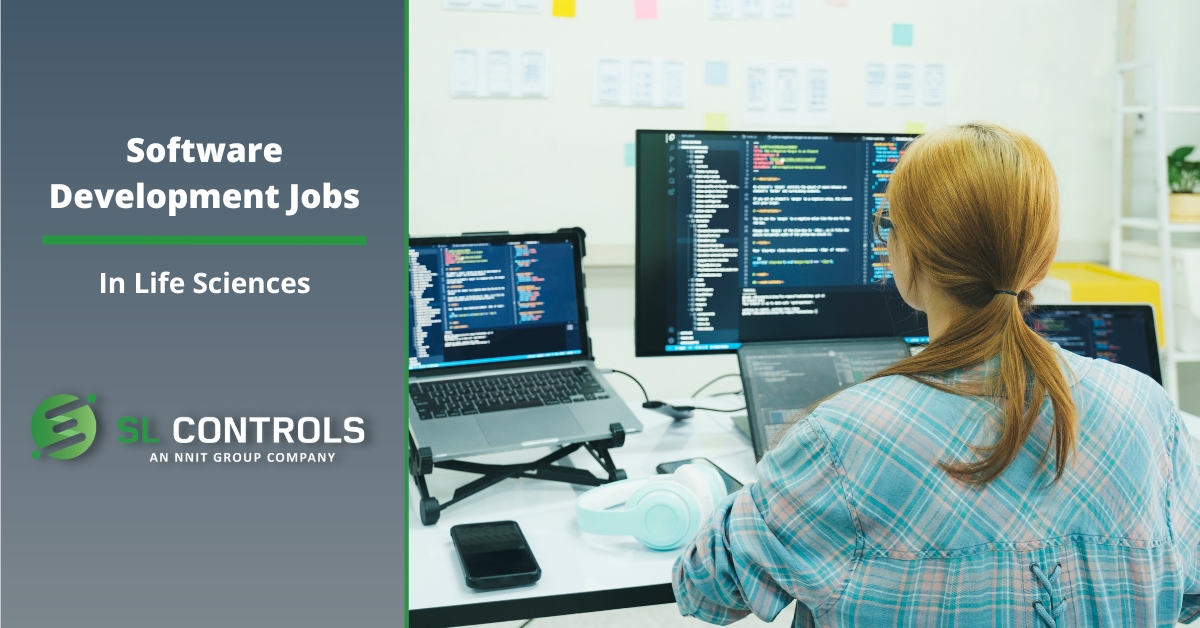
Opportunities in the Life Sciences Sector for Software Developers
An unwelcome trend has emerged over the past number of months for software developers working in the tech industry. That trend is one of job cuts, tech companies scaling down investment plans, and general uncertainty. This is resulting in many developers looking for alternative career options. The life sciences sector is not just an option, but a significant opportunity.
Speaking last year when he was Tánaiste and Minister for Enterprise, Trade and Employment, current Taoiseach Leo Varadkar said: “When it comes to big expansions and the big new jobs, it’ll be more in life sciences and more in manufacturing than in the tech sector.”
The predicted growth of life sciences is backed up by research. Take, for example, the medical device industry, which is part of the life sciences sector along with the pharmaceutical industry. According to McKinsey, 25 percent of the medical device market is projected to grow by at least six percent a year between 2022 and 2025.
Software Development Roles at SL Controls
At SL Controls, we see this growth every day as we specialise in providing technology and software solutions for companies in the life sciences sector, including many of the largest global pharmaceutical and medical device companies.
Eamonn McManus, Operations Manager at SL Controls, said: “We are currently growing as a company to meet the demands of our customers, so we are actively recruiting people with a range of different skills. For many of the roles we are recruiting for, software development skills and experience are at the top of the list of requirements.”
SL Controls provides systems integration solutions to pharmaceutical and medical device manufacturers. This means software is at the heart of our business and drives everything we do.
Eamonn said: “The systems integration solutions that we develop power the manufacturing environments of some of the biggest pharmaceutical and medical device companies in the world.
“We know this is a period of contraction in the technology sector, and many software developers might be looking for other opportunities. Those opportunities exist in the life sciences sector, including with us at SL Controls.”
Positively Impacting Patient Outcomes Around the World
“SL Controls is looking to add strong software developers who would like to move into the exciting and growing pharmaceutical and medical device industries,” said Jess Delahunt, Talent Acquisition Consultant at SL Controls. “If you are looking for a new challenge and are thinking about moving on from the tech sector, you will find a stable environment with unrivalled career development opportunities in life sciences. The work you will do for SL Controls will have a meaningful impact on the lives of millions of people around the world.”
Some of the skills we are looking for at SL Controls include:
- VB
- .NET
- C#
- SQL Server
- Python
- Java
- Automation Testing
Jess said there are various opportunities available: “Some roles are remote, some are hybrid, and some will require an onsite presence. However, we can discuss your requirements and preferences at interview, as we always work to find the best solution for suitable candidates.
“Strong software developers with over three years of experience and based in Ireland will be considered. I would encourage you to apply to find out more.”
Visit our recruitment page to find out more about working at SL Controls, or browse our current vacancies.

14 Tips for Your Engineering CV
Writing a compelling CV will help you land the ideal engineering job – one that pays well, challenges you, presents opportunities for career progression, and strikes the right work-life balance. How do you write a great engineering CV, though? Here are our (updated) 14 tips:
1. Make It Relevant
Tailor your CV to the job you are applying for as engineering roles are varied, even within disciplines. By tailoring your CV, you can show you have knowledge of the industry as well as highlighting specific skills and experience that will be beneficial to the role.
Tailoring your engineering CV could be something as simple as re-arranging the information to make certain points more visible. For example, if you are applying for a Control Systems Engineer position, you should make sure you give weight to your control systems experience. Also, you could replace part of your summary at the top of the CV with points that are control systems specific.
2. Research the Company
It is difficult to make your CV relevant if you don’t first research the company you are applying to. Look at the types of jobs they are recruiting for, the projects they have worked on, and the services they offer. Blog sections and mentions of the company in the press can also give you a good insight into its priorities and areas of focus. Also, if you know someone who already works in the company, talk to them.
3. Ensure It Is Easy for Recruiters to Read
Your engineering CV should be as easy to read as possible. The aim is to ensure recruiters reading your CV can quickly and easily identify the most important information.
So, state your engineering skills and experience explicitly. You can do this by highlighting projects you’ve worked on, responsibilities you’ve had, and tasks you’ve performed.
It is also important to get the layout right, with sections clearly labelled with headings.
4. Focus on the Most Important Points First
Focus a lot of your efforts on the beginning part of the CV as first impressions count. This is the section before your work and education history, where you highlight your main skills and experience, creating a short profile.
You can go into more detail later in the CV but make sure you list the most important and relevant points in this section. For example, you should include points tailored to the role you are applying for.
5. Use Relevant Engineering Words and Phrases
You should include engineering skills keywords in your engineering CV. You can do this in a list or throughout the content as you describe roles and achievements. Below are examples of the types of keywords you should include:
- Your technical skills
- Your software skills
- Programming languages you know
- Your hardware knowledge
- Your systems knowledge
- Processes you have experience with
- Frameworks you have experience with
- Compliance experience
Highlighting your industry experience through the words you use is also important, especially if the job prefers or requires specific experience.
6. Prove Your Skills
Following on from the last point, don’t just list your software and technical skills. It is also beneficial to explain how you have used those skills. The aim is to prove your competency. You won’t have space to do this with all the skills you have, so focus on those that are most important to the role you are applying for.
7. Include Achievements
Staying in the same topic area as the previous two points – remember that responsibilities are important, but achievements are crucial. Also, achievements provide evidence for your skills and knowledge. After all, it is easy to create a list of all the things you can do. The more impactful information will be evidence of how you have used your knowledge and skills. Therefore, focus on achievements as much as possible.
8. Highlight Your Soft Skills
Focusing on achievements will also highlight your interpersonal skills. This includes things like communication skills, leadership abilities, and teamwork skills. These are known as soft skills, and they are different from the hard skills you have as an engineer.
Don’t underestimate the importance of soft skills. Interpersonal skills, in particular, let the potential employer visualise the roles and duties you can perform, not just the technical capabilities you have.
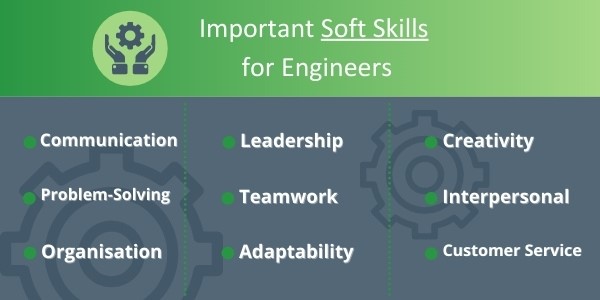
One final consideration with this point concerns working from home. In this post-Covid-19 era, many engineering roles potentially have a work-from-home element. Mentioning your capabilities in this regard can be beneficial. For example, highlighting time management skills and your ability to work on your own initiative.
9. Add Some Personality
Adding personality to your engineering CV will make it stand out from the rest and help to grab the attention of recruiters. Adding personality is not as easy as listing your qualifications and experience, so here are some tips:
- The cover letter that accompanies your CV is a great place to add some personality to your application.
- Talk about what you are passionate about professionally. What motivates and inspires you in the industry?
- Showing enthusiasm and passion for interests outside of work is also helpful. So, instead of listing some outside interests, explain why one or two of them are important to you.
- Don’t be overly formal in your cover letter. It needs to be professional, but it should be written in the first person with a conversational tone, and you shouldn’t be afraid to be yourself.
- Avoid business jargon as much as possible in your CV and especially in your cover letter.
10. Keep It Concise
Your CV should include detail, but make sure you write succinctly. It is important you strike the right balance between presenting an accurate picture of your experience and capabilities while not going overboard.
The more concise and comprehensive you can make the CV, the better. If you stray into a third page, you probably need to cut back a bit to two pages.
If you need to cut your CV back, the first thing you should look for is repetition. Anything you have said before can probably be removed.
Photos are also unnecessary, and they take up space, so they can be removed too.
11. Include a Project Page
If you have experience on multiple projects over several years, you may find it difficult to include everything important in two pages.
In this situation, you should include the main and most recent projects on your CV and then add a third additional page that contains a project list. This list should have the name of the project, the employer/client, and a brief, one-sentence summary/description of what you did, including the outcomes that were achieved.
12. Replace Paragraphs of Text with Bullet Points
Use bullet points instead of paragraphs as much as possible, as bullet-point lists are easier to read.
13. Include Non-Engineering Achievements
Include your achievements and experience outside engineering. This is particularly important if you are a new graduate without much engineering work experience.
Volunteer work, sporting achievements, or participation in community organisations can help the employer better understand who you are.
14. Check, Check, and Check Again
Check for and remove all mistakes. Of course, mistake-free CVs are necessary for all types of jobs, but the nature of engineering work makes it even more important that you pay attention to the details and check for errors. This means proofreading the CV.
After you proofread it, you should then get someone else to proofread it again to spot mistakes you may have missed.
Another proofreading technique is to leave the CV for a few hours before you proofread it again. Also, temporarily changing the text’s font to something completely different can help you spot mistakes you may have missed.
Keeping Your Engineering CV Up to Date
Your engineering CV is about selling you as a professional engineer. It should be a fluid document that you amend and customise for each role you apply for.
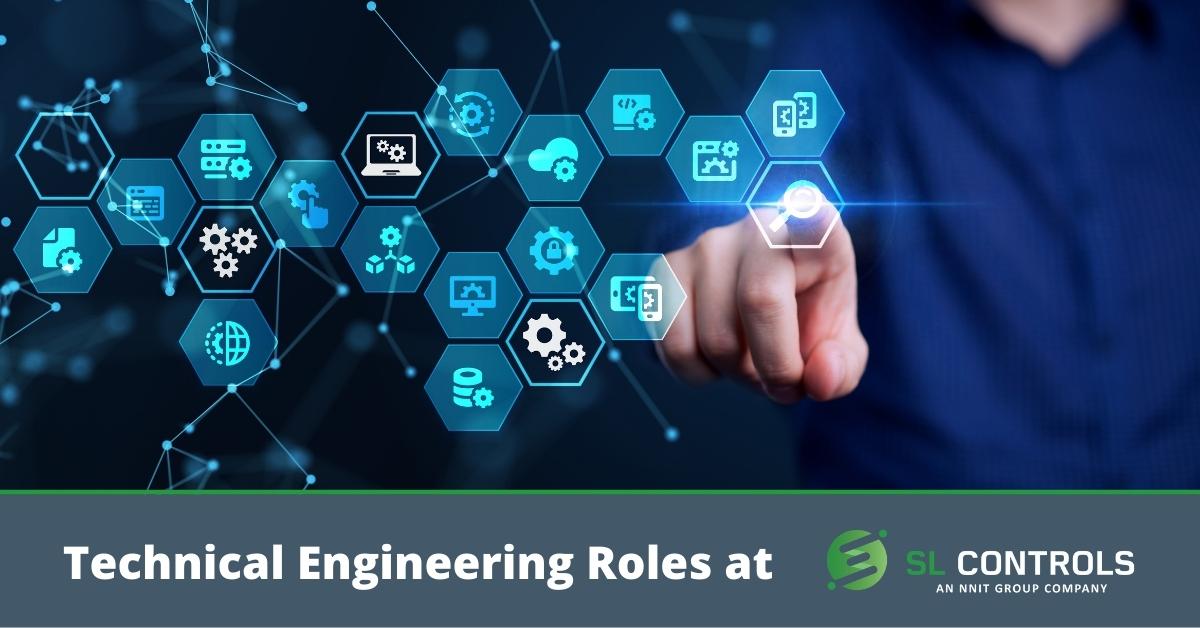
What You Need to Know About Technical Engineering Roles at SL Controls
As SL Controls continues to expand, we regularly have technical engineering vacancies to fill. What type of work would you be doing if you were recruited into one of these roles, and what is it like working at SL Controls?
This blog will give you an overview, but we are also available to provide you with information and answers to specific queries.
(SL Controls is now NNIT – visit NNIT careers section today.)
What We Do at SL Controls
At SL Controls, we provide advanced technology solutions and services to companies in the pharmaceutical, medical devices, and biotechnology industries. This means we work with global companies in the life sciences sector both in Ireland and internationally. We also work with exciting and innovative Irish companies in the life sciences sector.
All the companies we work with are industry leaders in the development and manufacture of treatment, diagnostic, and medical device products – products that positively impact patient outcomes around the world.
Our expertise is in the provision of equipment systems integration and smart manufacturing solutions that improve workflows and production line processes. Achieving Six Sigma and OEE targets are often essential objectives of the work that we do.
In other words, we help companies on their Industry 4.0 journey as they implement projects and initiatives to remain competitive, improve productivity, and deliver efficiency savings.
The projects we work on also help life sciences companies take advantage of the opportunities that innovative technology solutions make possible. We help our clients overcome challenges, too, including in areas like supply chain security, labour shortages, and regulatory compliance.
Technical Engineering Roles at SL Controls
The types of technical engineering roles that you might find on our job vacancies page include:
- Automation Engineer
- DeltaV Engineer
- SCADA Engineer
- POMS Engineer
- Install & Commissioning Engineer
- Controls Systems Engineer
- Systems Architect
- Controls Software Developer
What’s It Like Working in a Technical Role at SL Controls?
At SL Controls, we provide a supportive working environment where knowledge is shared, and everyone works towards the same goal. That might sound like hyperbole, but it reflects comments made by members of our team. Here are some examples:
- Meet the Team – Adam Barriger, SL Controls Systems Architect
- Meet the Team – Niall Malone, SL Controls Systems Engineer
We offer a comprehensive salary and benefits package to employees with a focus on work-life balance. We also have a policy of offering staff the opportunity of working fully remotely or on a hybrid basis. The exception is roles where fully remote working is not possible because of the hands-on nature of the project.
Who Are We Looking for in New Technical Engineering Recruits?
You will need to be qualified to bachelor’s degree or masters level in a relevant discipline. Experience in the life sciences sector is also an advantage.
We also look for people who have a passion for:
- Creating innovative technology solutions
- Solving challenging problems
- Working with pharmaceutical, medical devices, and biotechnology companies
If this sounds like something you are interested in, check out our recruitment page. You’ll find more information on working at SL Controls as well as details on our current vacancies.
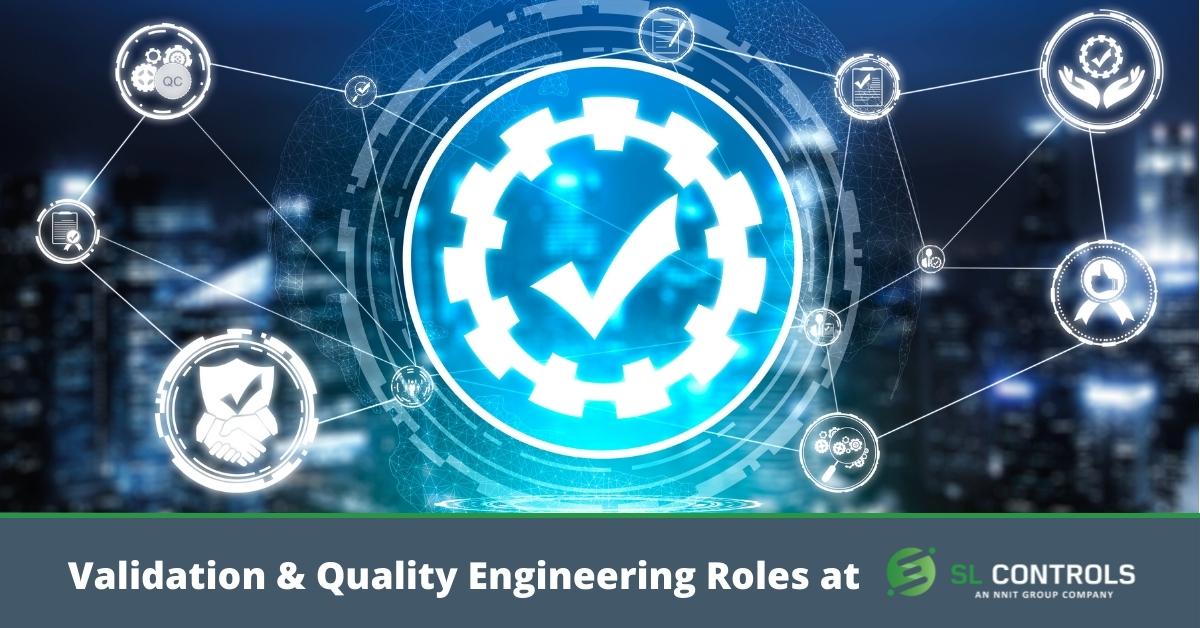
What You Need to Know About Validation and Quality Systems Engineering Roles at SL Controls
Validation and quality engineering are a core part of the services that we offer to clients. This means we have a large team of validation and quality engineers at SL Controls. That team is growing, too, as our company grows and expands into new markets.
If you are considering taking on a new role in validation or quality engineering, what opportunities are there at SL Controls, what sorts of projects will you be working on, and what is it like working for us? Maybe you are starting out in your engineering career and want to know if there are opportunities available for you.
In this blog, you will find a general overview of validation and quality engineering roles at SL Controls. If you have a specific query, however, please get in touch.
Validation and Quality Engineering Roles
The validation and quality engineering roles that we regularly recruit for to expand our growing team include:
- Computer Systems Validation Engineer (CSV Engineer)
- Validation Engineer
- Equipment Validation Engineer
- Software Quality Engineer
- Lab Systems (LIMS) Validation Engineer
- CQV Engineer
- Technical Writer
- Quality Assurance (QA) Engineer
You can find a list of current vacancies on our All Jobs page.
Who We Are and What We Do
At SL Controls, we provide specialist technology solutions to clients in the life sciences sector. This includes multinational pharmaceutical, medical device, and biotechnology companies. We specialise in the delivery of equipment systems integration projects with the aim of achieving objectives such as increased productivity, optimised OEE, and more efficient regulatory compliance.
We work with our clients to modernise their manufacturing and quality control processes, helping them do more with less while also ensuring they are ready for the challenges and opportunities of the future.
What’s the Working Environment Like at SL Controls?
The working environment at SL Controls is one of innovation and problem-solving. We have a strong team culture where staff at all levels are ready to offer help, advice, and support wherever it’s needed. We also have a strong knowledge-sharing and learning culture that includes structured continuous professional development and training programmes.
The Skills Required for Our Validation and Quality Roles
You will need a degree in a relevant discipline to apply for one of our validation or quality engineering roles. Experience working in the pharmaceutical, medical devices, or biotechnology sectors is an advantage, although it’s not strictly necessary.
There are then often job-specific skills and experience that we look for. However, we do have roles where experience is not required or can be substituted with academic experience.
One thing we do look out for in the candidate selection process is passion – passion for working with life sciences companies, as well as a passion for innovative technologies, problem-solving, and delivering on client objectives.
What Should You Do Next?
A good starting point is to visit the Recruitment page on our website. It has more information about working at SL Controls, including the extensive benefits package that we offer. You will also find out more about our approach to helping our employees achieve a positive work-life balance.
Details of our current vacancies are also on our recruitment page. And remember, if you have any queries, please get in touch.
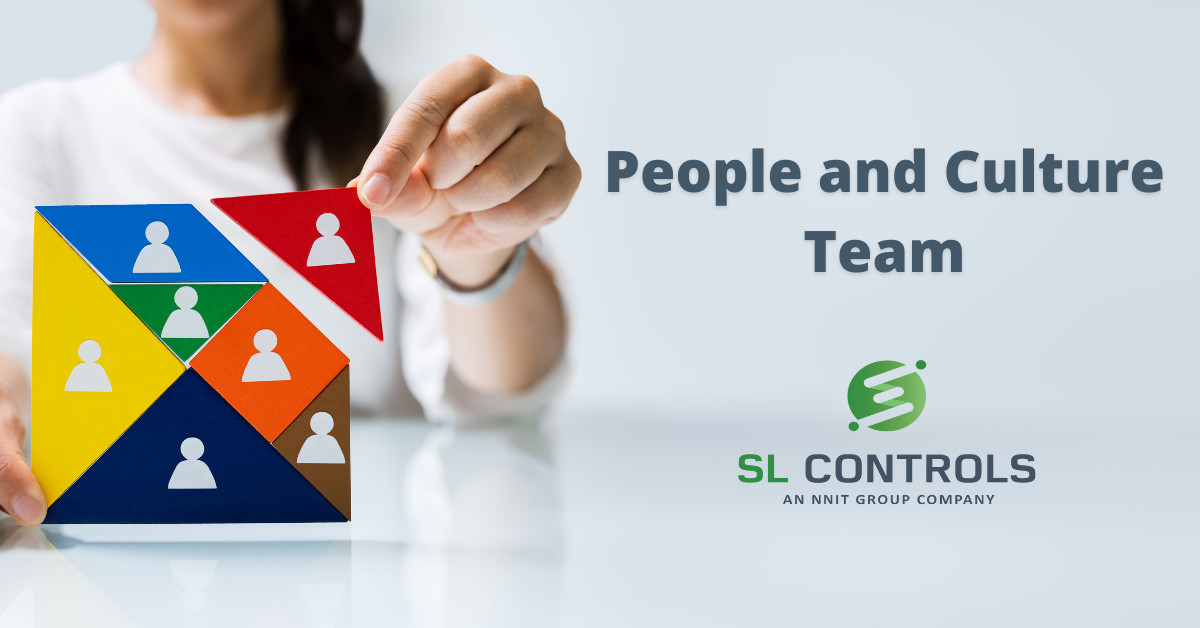
Renaming the SL Controls HR Department – Why and What it Means
The HR function in companies like SL Controls has evolved considerably. The traditional style of HR was largely focused on compliance and recruitment. Both areas are still incredibly important, but modern companies now have a much broader range of requirements.
As a result, we recently began an exercise to clarify the list of activities that we are responsible for and undertake as an HR team. The aim was to explore the option of changing the department’s name to make it more reflective of a modern workplace.
Was our assumption correct that the term HR is out of date? Does the term reflect what we do, and does it have relevance in a modern and forward-thinking company?
Review and Decision
We listed about 35 different activities that we are responsible for or are directly involved in as an HR team. Those activities include traditional HR tasks like record keeping, leave administration, employment law, and talent acquisition.
However, there is also a wide range of other activities that don’t fall neatly into the category of a traditional HR task. Those activities include things like employee wellbeing, manager coaching and support, community involvement, and training.
In fact, traditional HR tasks were in the minority on our list. As a result, we started brainstorming ideas for a new name for the department. That new name is: People and Culture Team
People and Culture Team
Those within the People and Culture Team (formerly known as HR) also have new titles to reflect the wider scope of activities that we are involved in.
Shauna Ryan, Director of People and Culture at SL Controls said: “Less than a third of the tasks that we do in what used to be the HR department are traditional HR tasks, so it makes sense to change the department’s name.
“Our roles in the company centre around people, culture, and development as we provide support both to the business and to individual employees. We believe the new name for the department – People and Culture Team – is the perfect fit.”
Norma Mulligan, People and Culture Team Executive at SL Controls said: “We looked at a number of different names when going through this process, including keeping the old HR name. However, the People and Culture name just clicked as it perfectly describes, in a nutshell, the various activities, tasks, and responsibilities we have within SL Controls.”
Keith Moran, CEO of SL Controls, said: “We have always been a people business at SL Controls, and that is even more true today than it was when we started. The days of companies operating with an old-fashioned HR department are long gone. So, it is right that we should rename the department, not only to reflect what the team does on a day-to-day basis, but also to ensure there is sufficient emphasis on areas like supporting and helping our people in SL Controls and continuing to strengthen our company culture. So, I am fully behind and supportive of changing to the new name People and Culture Team.”




